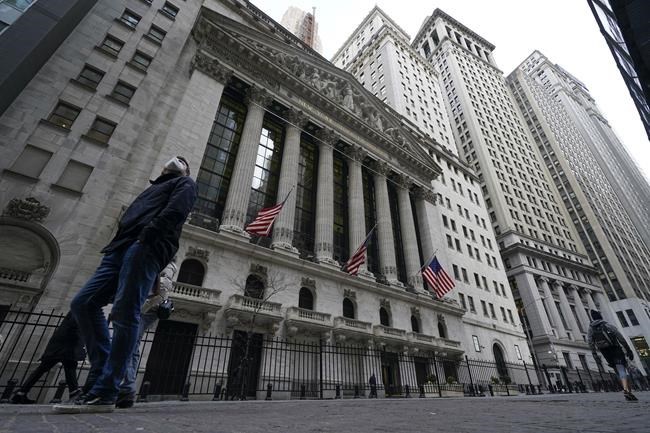NEW YORK (AP) — Wall Street is opening modestly lower as worries persist about the banking industry despite the lifelines it’s been getting. The S&P 500 was down 0.3% in early trading Friday. The Dow lost 0.6% and the Nasdaq was little changed. This week has been a whipsaw for global markets as concerns worsen about banks following the second- and third-largest U.S. bank failures in history. Markets had rallied a day earlier after two banks on both sides of the Atlantic tapped into tens of billions of dollars of cash to bolster their finances. But on Friday, both were lower. Treasury yields sank.
THIS IS A BREAKING NEWS UPDATE. AP’s earlier story follows below.
Wall Street drifted lower early Friday as a wobbly banking sector continued to be the focus in the U.S. and abroad.
Futures for the Dow Jones industrials fell 0.8% and futures for the S&P slipped 0.7%.
Despite a tumultuous week of wild swings spurred by the failure two U.S. banks, markets could still finish with gains for the week.
The past few days, markets' focus has turned to Switzerland's Credit Suisse and San Francisco's First Republic Bank.
First Republic tumbled 24% in premarket Friday, wiping out gains triggered Thursday after a group of 11 big banks offered a $30 billion lifeline to the latest troubled U.S. lender. First Republic rose 10% Thursday after slumping as much as 36% early in the day.
The S&P 500 jumped 1.8% Thursday, erasing earlier losses following the reports that First Republic Bank could get help or sell itself to another bank. Markets have gyrated this week on concerns over the toll on banks from the fastest set of interest rate hikes in decades. The turmoil flared with last week’s collapse of Silicon Valley Bank, the second largest bank failure in U.S. history.
“The market remains cautious; traders do not want to get overexcited, especially with investors still focusing on what can go wrong instead of what could go right,” Stephen Innes of SPI Asset Management said in a report.
Credit Suisse’s shares fell about 7% on the Swiss stock exchange Friday, a day after the Swiss central bank agreed to loan the bank up to 50 billion francs ($54 billion) to shore up its finances. Much like First Republic, shares of Switzerland’s second-largest lender have been whipsawing: they soared as much as 33% on Thursday after plunging by nearly as much the day before when the bank’s biggest shareholder said it would not invest more money.
Silicon Valley Bank's parent filed for Chapter 11 bankruptcy protection Friday, a week after its collapse. Since SVB’s failure, investors have been on the lookout for banks with similar traits, such as many depositors with more than the $250,000 limit that’s insured by the Federal Deposit Insurance Corp., tech startups and other highly connected people who can spread worries about a bank’s strength quickly.
The Federal Reserve’s fastest barrage of hikes to interest rates in decades, meant to drive down inflation, has shocked the banking system following years of historically easy conditions. Higher rates raise the risk of recession and hurt prices for stocks, bonds and other investments. That latter factor hurt Silicon Valley Bank, since high rates forced down the value of its bond investments.
Treasury yields fell again Friday, with the 2-year down to 4.07% from Thursday’s 4.17%. Just last week, the 2-year yield was above 5%. The yield on the 10-year slid to 3.46% from 3.58% a day earlier. That yield was above 4% last week.
U.S. Treasury Secretary Janet Yellen told a Senate committee on Thursday that the nation’s banking system “remains sound” and Americans “can feel confident” about their deposits.
Wall Street increasingly expects this week’s turmoil to push the Federal Reserve to hike interest rates next week by only a quarter of a percentage point. That would be the same sized increase as last month’s and half the hike of 0.50 points that was expected earlier.
The European Central Bank on Thursday raised its key rate by half a percentage point, brushing aside speculation that it may reduce the size because of all the turmoil around banks.
All the stress in the banking system has raised worries about a potential recession because of how important smaller and mid-sized banks are to making loans to businesses across the country. Oil prices have slid this week on such fears.
Bitcoin has been surging all week on the potential that the U.S. Federal Reserve will pause its string of interest rate hikes. It continued to churn higher Friday, gaining 8% in early trading and surpassing $27,000 each. It’s up more than 35% this week.
Markets in Europe turned sharply lower by midday, with Germany’s DAX falling 0.8% and the CAC 40 in Paris skidding 1%. In London, the FTSE 100 was down 0.7%.
In Asia, Hong Kong's Hang Seng jumped 1.8% to 19,548.26 and the Shanghai Composite index added 0.7% to 3,450.55.
Tokyo's Nikkei 225 index gained 1.2% to 27,333.79 and the Kospi in Seoul was up 0.8% at 2,395.69. Shares in major Japanese banks rebounded after falling sharply at times this week.
Australia's S&P/ASX 200 added 0.4% to 6,994.80. India's Sensex was 0.1% higher while Taiwan's Taiex surged 1.5%.
In other trading, U.S. benchmark crude oil retreated $1.02 to $67.33 a barrel in electronic trading on the New York Mercantile Exchange. It picked up 74 cents on Thursday to $68.35 a barrel.
Brent crude, the pricing basis for international trading, lost $1.18 to $73.52 a barrel.
The dollar fell to 132.70 Japanese yen from 133.76 yen. The euro rose to $1.0632 from $1.0611.
——-
Kurtenbach reported from Bangkok; Ott reported from Silver Spring, Md.
Elaine Kurtenbach And Matt Ott, The Associated Press



